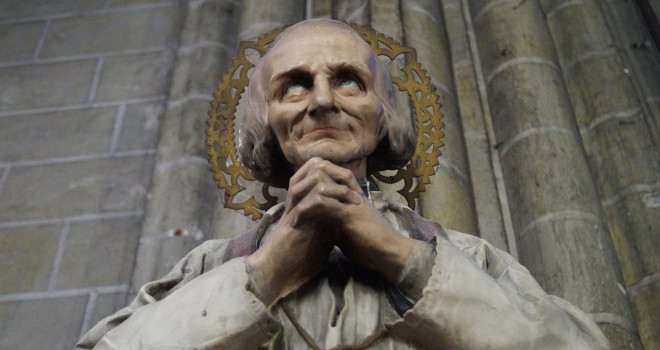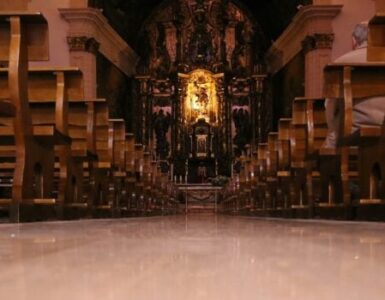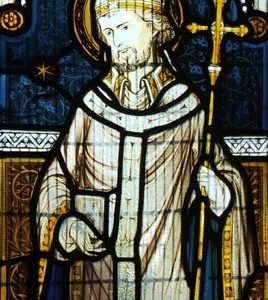Jesus said: “The Harvest is rich, but the laborers are few. Ask the Lord of the harvest to send more laborers.” (Mt 9:37-38) Essential to the extension of the Kingdom and the salvation of souls is the Sacrament of Holy Orders, which we call the priesthood.
One of the greatest priests in the history of the Church spent close to forty years in the Parish of Ars, spending from thirteen to eighteen hours daily in the confessional reconciling souls to God. This was Saint John Vianney, known as the Cure of Ars (1786-1859). This saint knew the extraordinary value of the priesthood:
“A good shepherd, a pastor after God’s heart, is the greatest treasure which the good Lord can grant to a parish, and one of the most precious gifts of divine mercy.”
Let us listen to the exact words of the Cure of Ars and then translate them into the application in our spiritual lives. Some of the words and quotations of the Cure of Ars are overwhelming in depth and beauty, yet of the utmost simplicity. Let us read and meditate and then apply:
The Priest’s Sublime Function
“O how great is the priest! If he realized what he was, he would die… God obeys him: he utters a few words and the Lord descends from Heaven at his voice, to be contained within a small host. Without the Sacrament of Holy Orders, we would not have the Lord. Who put him there in the tabernacle? The priest. Who welcomed your soul at the beginning of life? The priest. Who feeds your soul and gives it strength for the journey? The priest. Who will prepare it to appear before God, bathing it one last time in the blood of Jesus Christ? The priest—always the priest. And if the soul should happen to die (as a result of sin) who will raise it up, who will restore its calm and peace? Again the priest. After God, the priest is everything. Only in heaven will he fully realize what he is.”
Following will be a brief commentary on all the sublime functions the priest carries out to glorify God in heaven and for the salvation of the souls on earth.
If there is no priest, then there is no Holy Mass; if there is no Holy Mass, then there is no consecration of the Sacred Host. Without the consecration of the Sacred Host, there is no Holy Communion; and if there is no Holy Communion, then there is no Sacramental Presence of Jesus. That means that we become spiritual orphans. We become like a ship without a port, an arrow without a target, a scout without a compass, a dog without his master. We wander through life aimlessly and with no clear purpose.
The same great Saint made the following observation. In all the key spiritual moments in our lives, who is present?
Baptism?
Usually, it is the priest whom God uses as the instrument to transform the child into a son/daughter of God.
Confession?
It is only the priest who is the means by which we are reconciled to God through the outpouring of the Blood of the Lamb that cleanses our soul and conscience of the sin and guilt that weighs us down so heavily. Finally, we can experience true peace of soul!
First Holy Communion?
It was the priest who celebrated Holy Mass, confected the Eucharist and gave us the Body, Blood, Soul and Divinity of Jesus the Lord.
Confirmation?
It was the Bishop, who has the fullness of the priesthood, who confirmed us by which we were fortified with the presence of the Holy Spirit, ready to be soldiers of Christ to both spread and defend the faith.
What about Holy Matrimony?
It was most likely the priest who sat down explaining the sublime vocation of Holy Matrimony, the importance of being faithful until death do we part, and the importance of being open to life and bringing forth children into the world, so that one day they will be eternal citizens of Heaven. And if we were married in a Nuptial Mass, it was celebrated by the priest.
Anointing of the Sick?
It is the priest that we spontaneously call when we see our grandmother, mother or father, or any person’s health so seriously declined that they might die. It is the priest who anoints them with holy oil by which they are strengthened to fight the good fight and unite their sufferings to the sufferings of Our Lord and Savior Jesus Christ.
Death and burial?
Who is present at the Funeral Mass praying for our loved one who has passed away and gone to be judged by Jesus, who will come to judge the living and the dead? We all must pass through the gateway of death and pass from the realms of time into eternity. It is the priest, acting in the person of Christ while celebrating Holy Mass, who offers the Victim, Jesus, to the Father for the purification and salvation of this immortal soul.
Family problems?
When family problems set in, who is it that the family has recourse to work through these tangled, intricate and knotty problems? Frequently, it is the person of the priest who comes to mind. The priest becomes the listener, the sounding board, the counselor, as well as the consoler, to save the family from capsizing and sinking into the depths of sadness and oblivion! It is the priest who, like a human sponge, absorbs all of their problems in his heart and offers them to Jesus, the Eternal priest, for their healing and salvation.
Sorrows and sufferings of all sorts?
When sorrows, sufferings, contradictions, and depression visit our homes and our hearts, who is it we seek out for answers to problems that seem beyond the realm of solution? It is the good priest who listens to the problems. It is the priest who opens up his heart to hear and understand.
It is the priest who is called to the ministry of compassion. Exactly what does this word “compassion” mean? Compassion means the willingness and the ability to suffer with those who suffer.
Listening?
Who is the one we seek to listen to our inner anguish and agony, because we know others either do not know how to listen or they simply do not want to listen attentively. It is the priest whom we seek to be heard, to be listened to, and to be understood. How true this is! Often we might come to the priest overloaded with moral, emotional, spiritual baggage that we know not where to dump and so be alleviated from this burdensome weight. Then the priest receives us and invites us to be open and bare our hearts and reveal our tortured consciences.
Listening and healing. How often this is the scenario! We unload all of our baggage and the priest is simply there to listen. We weep, cry, complain, get angry, blurt out nonsensical ideas in our anguish and confusion. And the hands on the clock fly by—already 50 minutes, and then an hour has flown by!
After this session of unloading, we get up renewed, energized, with healing and hope. Overflowing in gratitude, we tell the priest thanks a million times for having been of great help to resolve these—so to speak—impossible problems! And he barely said a word!
Prayer?
How often have we felt totally overwhelmed with life’s problems that seem to be a mountain in size and weight? We want help and we know only God can help us. Who then is it we turn to with faith and trust to intercede on our behalf and pray for us so that this problem will be resolved, or at least so that we can cope with the problem better? It is the priest. The priest becomes the intercessor or the mediator for us between heaven and earth.
Turn to Our Lady
Let us then turn to Our Lady who is the Mother of God, the Mother of the Church, the Mother or all mankind. But, she is especially the Mother of priests. Let us beg Our Lady to place her mantle of love and protection and comfort over all priests so that they would be protected from the fiery darts of the enemy. May they also be protected from the devil of discouragement.
Let us beg Our Lady to pray for priests that they would strive with all of the energy in their minds, hearts and souls to conform themselves to Jesus, the High and Eternal priest. May Our Lady’s prayers help them to recognize Jesus as High and Eternal priest—how lofty and sublime—but also that Jesus is very close to them as their best Friend in time, and He will be their best Friend in heaven for all eternity.
✠
image: Sculpture of Jean-Marie Vianney in Sint-Petrus-en-Pauluskerk (Oostende), photo by Philipp Hertzog / Wikimedia Commons (CC BY 4.0)












